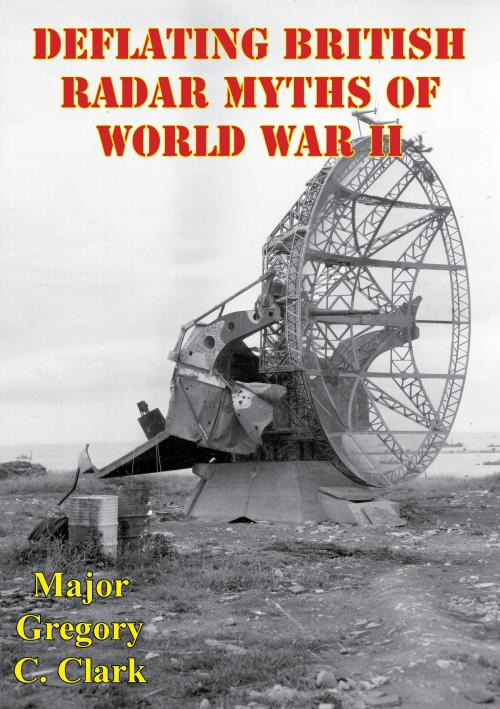Deflating British Radar Myths Of World War II
Nonfiction, History, Germany, European General, Military, United States| Author: | Major Gregory C. Clark | ISBN: | 9781782897903 |
| Publisher: | Lucknow Books | Publication: | August 15, 2014 |
| Imprint: | Lucknow Books | Language: | English |
| Author: | Major Gregory C. Clark |
| ISBN: | 9781782897903 |
| Publisher: | Lucknow Books |
| Publication: | August 15, 2014 |
| Imprint: | Lucknow Books |
| Language: | English |
British and Allied memoirs and histories have contributed to the rise of three myths concerning the discovery and employment of radar. These myths are as follows. The first myth is that Sir Robert Watson-Watt is the father and sole inventor of radar. The second is that Germany’s discovery and realization of radar’s military worth occurred after 1940 following exposure to British systems. The third myth gives radar the pivotal role in the defeat of the Luftwaffe in the Battle of Britain.
To deflate these myths the origin of radar is traced from James Maxwell’s discovery of radio waves to early radar theorists and inventors. Their role in the story of radar illuminates and contributes to the deflation of the radar myths.
Both the rebirth of the Luftwaffe and evolution of the R.A.F. during the 1920’s and 1930’s shows how each service independently arrived at the development of radar technology for different reasons. In 1939 Germany possessed some of the world’s best and most enduring radar designs, as well as essential navigation and bombing aids. England’s Chain Home radar was a dead end technology with serious shortcomings, but was skillfully melded to an innovative command and control system. The illumination of German radar achievements and a balanced analysis of British defensive systems essentially deflates the radar myths.
British and Allied memoirs and histories have contributed to the rise of three myths concerning the discovery and employment of radar. These myths are as follows. The first myth is that Sir Robert Watson-Watt is the father and sole inventor of radar. The second is that Germany’s discovery and realization of radar’s military worth occurred after 1940 following exposure to British systems. The third myth gives radar the pivotal role in the defeat of the Luftwaffe in the Battle of Britain.
To deflate these myths the origin of radar is traced from James Maxwell’s discovery of radio waves to early radar theorists and inventors. Their role in the story of radar illuminates and contributes to the deflation of the radar myths.
Both the rebirth of the Luftwaffe and evolution of the R.A.F. during the 1920’s and 1930’s shows how each service independently arrived at the development of radar technology for different reasons. In 1939 Germany possessed some of the world’s best and most enduring radar designs, as well as essential navigation and bombing aids. England’s Chain Home radar was a dead end technology with serious shortcomings, but was skillfully melded to an innovative command and control system. The illumination of German radar achievements and a balanced analysis of British defensive systems essentially deflates the radar myths.

![Cover of the book TALLY HO! - Yankee in a Spitfire [Illustrated Edition] by Major Gregory C. Clark](https://www.kuoky.com/images/2014/august/300x300/9781782893400-wA48_300x.jpg)





![Cover of the book Tail Gunner Takes Over [Illustrated Edition] by Major Gregory C. Clark](https://www.kuoky.com/images/2016/july/300x300/9781786259295-N9bc_300x.jpg)

![Cover of the book Busting The Bocage: American Combined Arms Operations In France, 6 June-31 July 1944 [Illustrated Edition] by Major Gregory C. Clark](https://www.kuoky.com/images/2014/august/300x300/9781782893806-cqqy_300x.jpg)
![Cover of the book On The Road To Kut, A Soldier’s Story Of The Mesopotamian Campaign [Illustrated Edition] by Major Gregory C. Clark](https://www.kuoky.com/images/2014/june/300x300/9781782891758-zjOL_300x.jpg)




